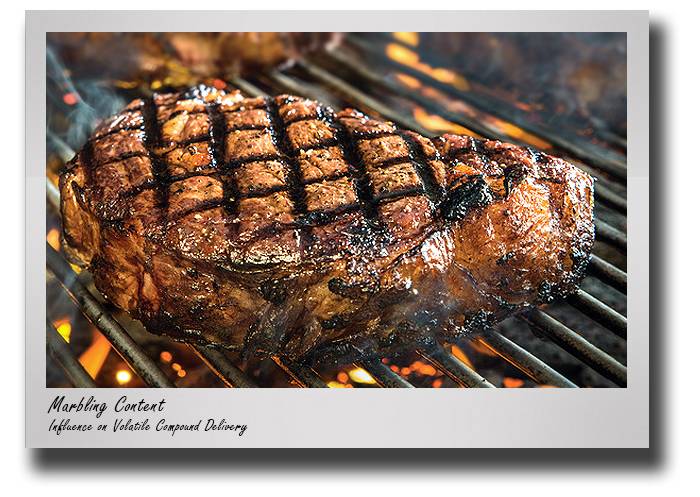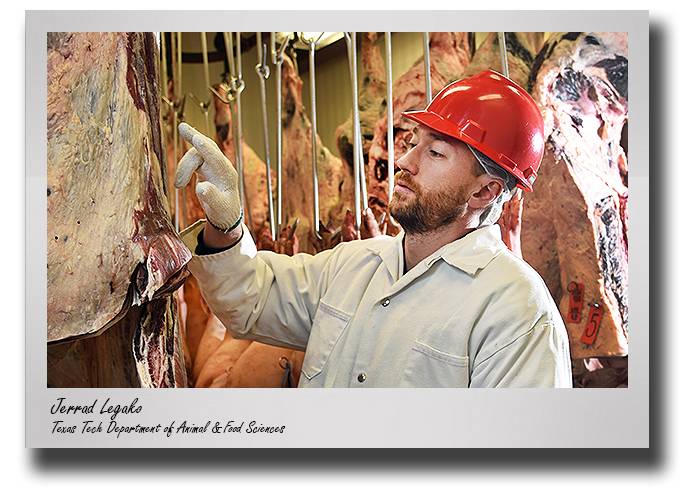AFS’s Jerrad Legako details keys to your best beef-eating experience
By: Norman Martin
 What makes a great steak? No question, flavor is at least equivalent to tenderness
in importance to the overall eating experience, if not a little more, says Jerrad Legako, an associate professor with Texas Tech University's Department of Animal and Food
Sciences.
What makes a great steak? No question, flavor is at least equivalent to tenderness
in importance to the overall eating experience, if not a little more, says Jerrad Legako, an associate professor with Texas Tech University's Department of Animal and Food
Sciences.
 But what is flavor, and how is it experienced. Well, it's a complex combination, said
the Lubbock-based meat science researcher. More than taste on the tongue, flavor takes
in perceptions of texture and mouthfeel. Additionally olfaction, Legako said is a
technical term for the world of aroma and flavor. Further receptors on the tongue
help perceive spiciness. Ambiance and prior experiences also help complete the overall
eating experience and flavor.
But what is flavor, and how is it experienced. Well, it's a complex combination, said
the Lubbock-based meat science researcher. More than taste on the tongue, flavor takes
in perceptions of texture and mouthfeel. Additionally olfaction, Legako said is a
technical term for the world of aroma and flavor. Further receptors on the tongue
help perceive spiciness. Ambiance and prior experiences also help complete the overall
eating experience and flavor.
All of these attributes affect perceptions of flavor, but Legako and his research team are looking for a nuanced key to the best beef-eating experiences. "With the sensitivity of the olfaction system, volatile compounds are incredibly important for our perceptions of flavor," he said.
They're volatile because they evaporate at room temperature. The organic compounds start as sugars, amino acids, lipids and thiamine, breaking down in beef's aging, storage and cooking processes. Sugars and amino acids are also water soluble and may provide basic tastes like sweet, sour, salty and bitter.
Then cookery enters with the Maillard reaction, a process that reduces sugars and proteins to the volatile compounds that add flavors perceived as nutty, roasted, garlicky, whiskey and honey. Similar to the browning and roasting of other foods dumplings, cookies, biscuits, marshmallows—and steaks, of course.
 "With time and temperature, you can kind of start to think about this as a chemistry
equation," Legako said. "You're driving that reaction at different rates just depending
on exposure time and the level of heat."
"With time and temperature, you can kind of start to think about this as a chemistry
equation," Legako said. "You're driving that reaction at different rates just depending
on exposure time and the level of heat."
 Lipids, the top contributor, produce flavor through oxidation, Legako said, citing
Australian studies: "Fat is the delivery system." Among beef cuts with varying fat
levels, those with the most fat would always deliver more of the same volatile compounds.
Lipids, the top contributor, produce flavor through oxidation, Legako said, citing
Australian studies: "Fat is the delivery system." Among beef cuts with varying fat
levels, those with the most fat would always deliver more of the same volatile compounds.
To be clear, the flavor components fat delivers come not from the fat but from the effects of cookery on amino acids and sugars. "Yet they're dissolving in that fat, retained in that high-fat sample and being delivered," he said, "an increased sensory response or a more intense beef flavor through the greater delivery of those volatile compounds."
Basically, fat serves as a reservoir to deliver flavor.
Legako and team tested this reaction across different cookery types, higher degrees of doneness and different grades of beef. The consistent find? The higher the grade, the better the flavor, increasing linearly from Standard to Prime. "This is at least some support for marbling content in a way influencing volatile compound delivery," Legako said.
Legako, who joined the Texas Tech faculty member in 2016, is charged with instructing courses, such as experimental techniques in meat chemistry and muscle biology, food analysis, and food chemistry. He received the American Meat Science Association's 2019 Distinguished Achievement Award.
Legako's research and teaching specialization is in the area of meat science, and his research program primarily focuses upon pre- and post-harvest factors which influence beef quality. Some of the specific factors being explored in Legako's research group include how animal diet, management, genetics, post-mortem aging, packaging and cooking influence beef flavor.
Contributing: Abbie Burnett - Certified Angus Beef
CONTACT: Michael Orth, chairman, Department of Animal and Food Sciences, Texas Tech University at (806) 834-5653 or michael.orth@ttu.edu
1015NM20 / PHOTO: Certified Angus Beef LLC (Wooster, Ohio)
Davis College NewsCenter
-
Address
P.O. Box 42123, Lubbock, Texas 79409-2123, Dean's Office Location:Goddard Building, Room 108 -
Phone
(806)742-2808 -
Email
kris.allen@ttu.edu
